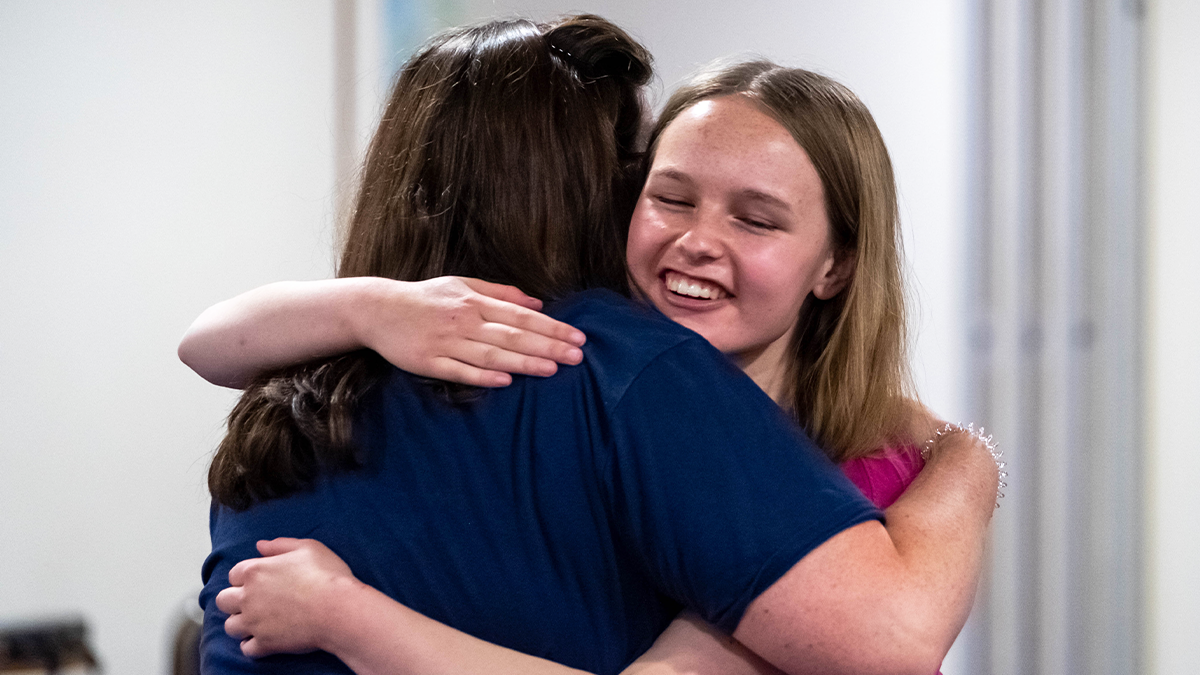From sharing a tuning fork and exercising patience to checking in on your musical neighbour, it’s good to be kind…
Joining an inclusive youth orchestra and meeting a diverse group of musicians who share your passion for performing is an exciting experience that creates memories to last a lifetime.
But for newcomers or those facing significant challenges outside the rehearsal room, such as a physical disability or mental health condition, it can also feel very daunting.
To raise a smile and help others along on their musical journey, here are a few top tips from our National Orchestra for All ambassadors.
Read more: Watch young musicians’ plea as they urge public to break down barriers to music making >
1. Help each other when setting up the space
It’s a very simple thing but makes such a difference. I always find that everyone chipping in when taking out or putting away stands and chairs during a rehearsal helps me feel a bit more connected with the other musicians. – Isaac
2. Be aware of your neighbours (in all directions)
Always check that everyone knows what’s going on and that they’re feeling okay – and if you see someone who isn’t, try to help them or tell someone who can. We all have to work together to make such wonderful music! – Joe
Learn more: 5 of the best ways to protect your wellbeing >
3. Make sure everyone can see
Be aware of how you position yourself, so that both you and your orchestra friends can easily see the music and keep eye contact with the conductor. Music notations are great and are usually added mid-practice, but any notations should be clear to everyone. – Mars
4. Get to know people
Don’t be afraid to talk to others, even if it’s just something about the music. Being friendly with the people you’re playing with can make even the longest day of rehearsals more enjoyable – and you know that you’ve already got one thing in common with them… you all love music! – Phoebe
Meet Orchestras for All’s musicians >
5. Don't get worked up about technical mistakes
If someone fluffs up during a rehearsal, don't pressure them or make them feel bad about it. Rehearsals are a time for you all to identify the bits that need work – and if you create an atmosphere where it’s okay to make mistakes, people will feel more confident about experimenting with the important stuff in the music like colour and tone. – Isaac
6. Share with your desk partner
You and your desk partner (if you have one) are going to be in close proximity to one another for a long time. If you show patience, share that rosin or tuning fork and find the ‘sweet spot’ where you can hear both parts equally, you’ll be fine. – Joe
7. Lead by example
Conductors are just as important as the music as they count you in and out, so they should make sure they always project their actions clearly for an inclusive group. Every leader has a different conducting style, so pay special attention to how they move and don’t be afraid to ask questions if you are unsure. All of the National Orchestra for All conductors are really nice! – Mars
8. LEND a pencil
Sounds daft I know, but we’ve all been there: digging into the bottom of your bag for the pencil you swear you put in there last night, only to end up empty-handed. Bringing a pencil gives you an easy way to introduce yourself to people and strike up a conversation. Plus, it makes everything sound better because you can all mark your sheet music! – Phoebe
‘Don’t put yourself down’: 18-year-old flautist shares her advice with other young musicians >
9. Check in between rehearsals
When you’re in an orchestra you can go a long time without seeing one another between events, especially during the coronavirus pandemic. It’s always nice to check that people are doing okay when you see them but this goes for outside the orchestra setting too – stay in contact with your musical friends, it could brighten their day! – Joe
10. Count, count, count!
When you have a long rest or multiple bars of rest, count on your fingers – this is really helpful for both you and your partner if either of you ever loses your place. Sometimes when this happens in National Orchestra for All rehearsals, keeping an eye on the tutors who are counting really helps too. – Mars
Find out more about Orchestras for All’s tutors >
11. Stay professional
I know, it feels impossible not to constantly chat when you’re surrounded by all your friends – but you’re not in rehearsals to natter, you’re there to play music! I’m not saying you have to stay silent at all times, but being quiet when your conductor or teacher is trying to help others means they’ll be happier and makes getting through the music a breeze. Plus, easier rehearsals means shorter rehearsals – giving you more time to chat outside afterwards! – Phoebe
12. Give everyone their time to shine
If you’re learning tricky sections of repertoire, some members will take longer to master their part than others. If someone has been struggling with that epic trill, bowing pattern or reaching that top note for a while but perfects it later on, celebrate the wins! By encouraging others as you go along, you'll foster trust and have more fun.
13. And finally, treat everyone equally
It doesn’t matter where you’ve come from or what challenges you may be facing outside the rehearsal room – an inclusive orchestra is all about togetherness and when you arrive, you can leave your worries at the door. From pretty flute solos and catchy riffs on the bass guitar to soaring strings and booming brass, remember that each and every member has an important part to play. So without further ado, let’s make music!
Feeling kind? Please support diverse orchestras and donate today >









